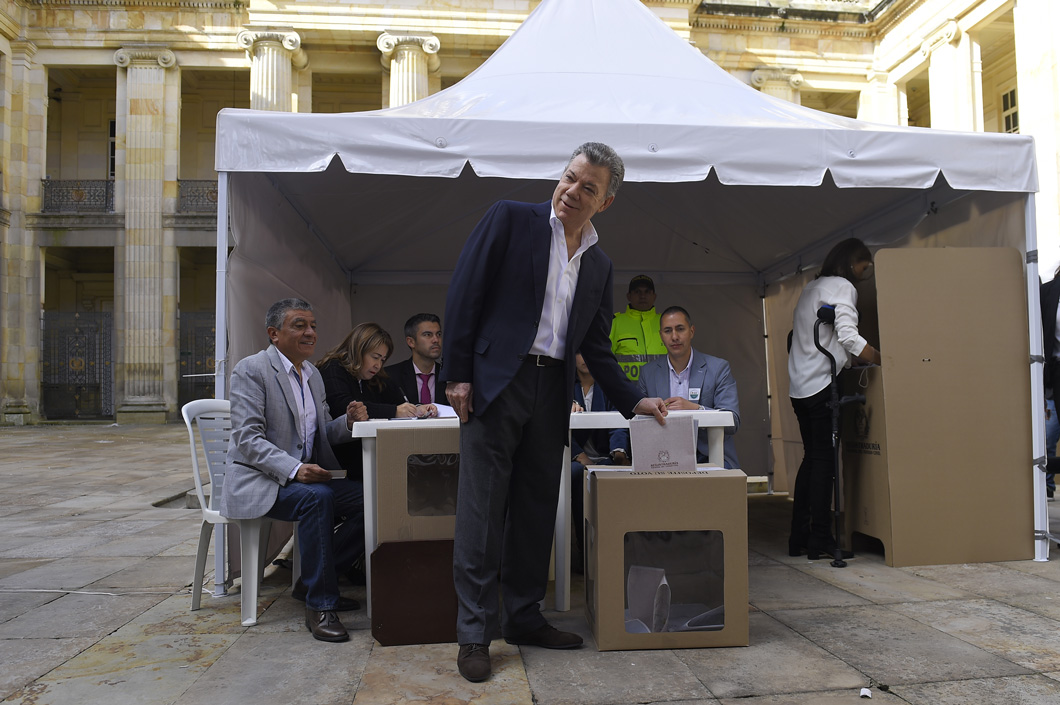
President Santos encourages Colombians to go and vote at the start of the day. Photo:Efraín Herrera – SIG
Centro Democrático takes the largest number of senatorial seats and Ordóñez is forced to give up his presidential hopes in the Colombian elections.
Colombia went to the polls today (March 11) for the congressional elections. A concurrent ballot dealt with the nominations for the presidential candidatures of two parties. The day saw plenty of drama, but when the dust settled there were few surprises.
Voting was marred by controversy with various claims and videos circulating on social media. What does seem to be clear is that certain polling stations ran out of ballot papers. That ended in farcical scenes, with the registraduría – the organisation responsible for organising the elections, stating that even photocopies of the ballot were legally allowed to vote with. This mainly affected the right-wing candidates, where La Gran Consulta por Colombia settled the candidacy between Iván Duque, Marta Lucía Ramírez and Alejandro Ordoñez. In reality it had little impact on the outcome, but will surely set the scene for further accusations of electoral impropriety when the Presidential elections roll around in May.
Related: Presidential election 2018: What to expect?
The big loser of the night was former procurador Alejandro Ordóñez, who picked up fewer than 400,000 votes in the Gran consulta por Colombia. Marta Lucia Ramírez took four times that and Duque picked up over four million votes. That prompted Duque to offer Ramírez the undercard on his presidential bid, which she accepted. For his part, Ordóñez released a statement saying he would “honour his word and support Duque and Ramírez.”
In the other presidential nomination card, for the Inclusión social por la paz coalition, Gustavo Petro claimed a landslide victory over unknown Santa Marta politician Carlos Caicedo, collecting the lion’s share of the three and a half million votes cast. Petro claimed the ballot papers for his coalition had also run out in several polling stations while they were hidden in others. His victory was no surprise, and the ex-mayor of Bogotá will now push on with his presidential bid with Caicedo quickly stating his support to Petro’s candidacy.
Influential senator Álvaro Uribe retained his position of power in the Senate with the largest number of senatorial seats going to his Centro Democrático party. With all but three seats claimed as we went to press, the CD held 19 – compared to 20 in the congressional elections of 2014, with the Cambio Radical of Vargas Lleras following on 16 – nine in 2014, and the Partido Conservador on 15 – 19 in 2014.
Left-wing parties had less to celebrate in the Senate, with the Alianza Verde picking up the most seats at ten, with just five and four respectively for the Polo and the Decentes coalition. The FARC only got 0.34% of the vote. Nevertheless, the newly created political party got the five seats in each house guaranteed to them in the peace agreement.
Abstention was another strong theme. Although it dropped, more than half the ballots in the country were not cast. Added to this were a further 850,000 votos en blancos – people who chose to vote, but reject all the available options. In total, a disappointing 15,000,000 were cast for parties. That’s less than a third of Colombia’s population, but is still the highest turnout for congressional elections in history.
Find the official election results here





